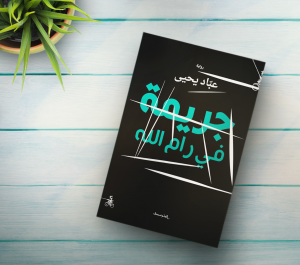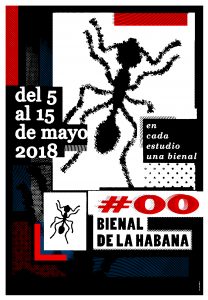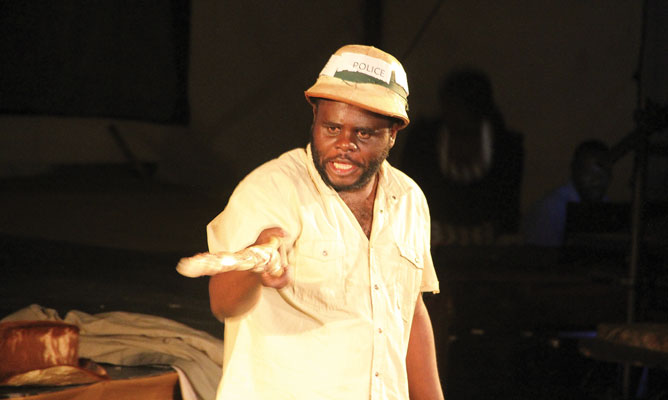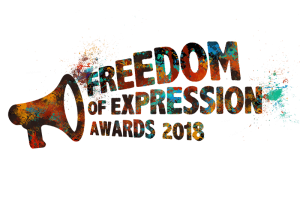22 Mar 2018 | Awards, Fellowship 2018, News
[vc_row][vc_column][vc_video link=”https://youtu.be/WzJkJikmYe8″][vc_column_text]Abbad Yahya is a 29-year-old Palestinian novelist whose fourth novel Crime in Ramallah was banned by the Palestinian authority in the West Bank in 2017. The novel includes depictions of gay sex, as well as political commentary about fanaticism and religious extremism — subjects largely considered taboo in the region. All copies of the book were confiscated by the attorney general in February this year, on the grounds it contained texts that threatened public decency.

When the controversy arose, Yahya was abroad in Qatar. He was so afraid for his life that he did not to go back to his native Ramallah and spent time in other countries in the Middle East and Europe. Threats were issued to him and his family via social media and copies of the book burnt on the Gaza strip. The Public Prosecutor issued a summons for questioning against Yahya and detained the distributor of the novel.
Despite this, Yahya has spent the last year giving interviews to the international and Arab press and raising awareness of freedom of expression and the lives of young people in the West Bank and Gaza, particularly in relation to their sexuality.
“In my point of view, the most important impact of all of this, was raising the awareness amongst the youth and their decisions that are related to their sexual lives, as well as making a public discussion about the issue,” says Yahya.
Crime in Ramallah follows the lives of three young Palestinian men and the different ways they cope with living in the claustrophobic society of Ramallah. The passage in the novel most cited as causing outrage is when one of the characters sees a picture of the Palestinian leader Yasser Arafat with a gun and imagines it as a penis.
The novel was criticised by some of Yahya’s own colleagues. According to AP, the head of the Palestinian Writers Union, Murad Sudani, said it was a: “silly novel that violates the national and religious values of the society in order to appease the West and win prizes.”
 “The job of the writer in our occupied country is to raise the hope and enlighten people — not to break the national and religious symbols,” Sudani added. “My freedom as a writer ends when the freedom of the country begins.”
“The job of the writer in our occupied country is to raise the hope and enlighten people — not to break the national and religious symbols,” Sudani added. “My freedom as a writer ends when the freedom of the country begins.”
But Yahya does not agree. “Censors proclaim themselves to be the representatives of the public and their opinion, while present us as an obscure minority, insignificant in its voice and influence,” Yahya tells Index on Censorship. “This nomination proves the exact opposite, as it comes as a recognition of what we do and the things we stand for, and a proof that our voice is indeed heard. Freedom is contagious, and being one of the nominees strengthens my unshakable conviction in the ideals of freedom and freedom of expression.
See the full shortlist for Index on Censorship’s Freedom of Expression Awards 2018 here.[/vc_column_text][/vc_column][/vc_row][vc_row full_width=”stretch_row_content” equal_height=”yes” el_class=”text_white” css=”.vc_custom_1490258749071{background-color: #cb3000 !important;}”][vc_column width=”1/2″][vc_custom_heading text=”Support the Index Fellowship.” font_container=”tag:p|font_size:28|text_align:center” use_theme_fonts=”yes” link=”url:https%3A%2F%2Fwww.indexoncensorship.org%2Fsupport-the-freedom-of-expression-awards%2F|||”][vc_column_text]
By donating to the Freedom of Expression Awards you help us support
individuals and groups at the forefront of tackling censorship.
Find out more
[/vc_column_text][/vc_column][vc_column width=”1/2″ css=”.vc_custom_1521478525252{background-image: url(https://www.indexoncensorship.org/wp-content/uploads/2017/05/2017-awards-fellows-1460×490-2_revised.jpg?id=90090) !important;background-position: center !important;background-repeat: no-repeat !important;background-size: cover !important;}”][/vc_column][/vc_row][vc_row][vc_column][vc_basic_grid post_type=”post” max_items=”4″ element_width=”6″ grid_id=”vc_gid:1521806417232-57215ec6-b0de-4″ taxonomies=”10735″][/vc_column][/vc_row]
21 Mar 2018 | Awards, Fellowship, Fellowship 2018, News
[vc_row][vc_column][vc_video link=”https://youtu.be/-6JnYDCLKIE”][vc_column_text]The Museum of Dissidence in Cuba is an online website and public art project celebrating dissent in Cuba. It was set up in the summer of 2016 by acclaimed young artist Luis Manuel Otero Alcántara and his partner, curator and art historian Yanelys Nuñez Leyva. Their stated aim is to reclaim the word “dissident” and to give it in Cuba a positive connotation.

This is a daring and unique project, created by representatives of a new, young generation of artists who are not afraid to challenge the still repressive regime and promote freedom of expression. The repercussions have been fierce: Nuñez was sacked from her job at state sponsored magazine Revolution and Culture for founding the site. Otero was arrested in November 2017 for organising an unofficial #00Havana Biennal through the museum and threatened with prison for being a “counter-revolutionary”.
Cuba is still a one-party communist state. Political pluralism is outlawed and dissent repressed. There are also severe restrictions on press freedom, assembly, speech and association, according to Freedom House. The project aims to bring people from inside and outside Cuba together online, but specialises in radical public art projects and installations, concentrated in the poorer districts of Havana. The founders say that because it is not on either side of the political divide it is particularly vilified and attacked.
On his Index Awards nomination, Alcántara said “having won this prize is super important, for the MDC as well as for all Cuban activism, because it’s an acknowledgement from a prestigious international institution. This legitimises the work that we’ve been doing in favour of a future of freedom on the island, makes it more visible and brings protection and a certain empowerment to keep working despite all the unfairness and insecurity that we experience here.”
In 2017 the site promoted artistic projects round the island. The museum worked with a group of graffiti artists to create murals of aliens and balaclava clad men on the dilapidated walls of Havana in September 2017 to show up the government, which only allows political slogans and pictures of Cuban revolutionaries.

In another striking project they have reexamined the work and lives of important Cuban writers who committed suicide in suspicious circumstances. A terrifying art installation by Amaury Pacheco depicted a man hanging above the street in homage to the poet Juan Carlos Flores. The museum held a series of artistic events in San Isidro, a poor neighbourhood of Old Havana to honour the poets who had killed themselves because of the repressive Cuban regime.
The project #00 Biennial of Havana is the museum’s latest action, born as an act of protest against the decision of the Ministry of Culture to postpone until 2019, the celebration of the XIII Biennial of Havana. It was this project which led to founder Otero being arrested. He is now free on bail.
With this Index Award nomination, the work is being recognised for its bravery. In response, curator Yanelys Levya notes that “living on an island makes us believe we are alone in everything that we do. To know that there’s someone, in any part of the world, that supports our struggle and that their dreams are close to ours, makes us feel safer, stronger and gives us hope.”
See the full shortlist for Index on Censorship’s Freedom of Expression Awards 2018 here.[/vc_column_text][/vc_column][/vc_row][vc_row][vc_column][vc_column_text]
#IndexAwards 2018: los creadores del Museo de la Disidencia siguen ferozmente fieles a su proyecto
El Museo de la Disidencia representa a una nueva generación de jóvenes artistas que no temen desafiar al todavía represor régimen cubano
El Museo de la Disidencia en Cuba es una página web y proyecto de arte público que celebra el acto de disidir en Cuba, creado el verano de 2016 por el aclamado joven artista Luis Manuel Otero Alcántara y su pareja, la comisaria e historiadora del arte Yanelys Núñez Leyva. Su objetivo es reclamar la palabra “disidente” y otorgarle una connotación positiva en el contexto cubano.
Se trata de un proyecto atrevido y extremadamente original, creado por los representantes de una nueva generación de jóvenes artistas que no temen desafiar al régimen, aún represor, y promover la libertad de expresión. Han sufrido duras represalias: Núñez fue despedida de su trabajo en la revista Revolución y Cultura, financiada por el estado, por fundar la web. A Otero lo arrestaron en noviembre de 2017 por organizar la #00Bienal de La Habana —un evento no oficial— a través del museo, y se enfrentó a penas de prisión por “contrarrevolucionario”.
Cuba sigue siendo un régimen comunista de partido único. La pluralidad política es ilegal y la disidencia, reprimida. También existen duras restricciones a la libertad de prensa, reunión, expresión y asociación, según informa Freedom House. El proyecto busca favorecer el encuentro online de personas dentro y fuera de Cuba, pero se especializa en proyectos e instalaciones de arte público y radical, concentrados en los distritos más pobres de La Habana. Los fundadores afirman que es el hecho de no encontrarse ni a un lado ni al otro de la división política lo que hace que sean objeto de tantos ataques e intentos de descrédito.
Sobre su nominación a los Index Awards, Alcántara dijo: «haber ganado este premio es súper importante, tanto para el MDC como para todo el activismo cubano, porque supone el reconocimiento de una institución de prestigio internacional. Legitima el trabajo que hemos estado haciendo a favor de un futuro de libertad en la isla, lo visibiliza y nos facilita protección y cierto empoderamiento para seguir trabajando pese a toda la injusticia y la inseguridad que vivimos aquí».
En 2017 la web promocionó proyectos artísticos de toda la isla. En septiembre del año pasado, el museo trabajó con un grupo de artistas de grafiti en la creación de murales de extraterrestres y hombres con pasamontañas sobre los deteriorados muros de La Habana para ridiculizar al gobierno, que solo permite eslóganes políticos e imágenes de revolucionarios cubanos.
En otro de sus llamativos proyectos, han reexaminado las vidas y obras de escritores cubanos de renombre que se suicidaron en circunstancias sospechosas. Una aterradora instalación de Amaury Pacheco representó a un hombre ahorcado sobre la acera en un homenaje al poeta Juan Carlos Flores. El museo celebró una serie de eventos artísticos en San Isidro, un barrio pobre de La Habana Vieja, en honor a los poetas que se han quitado la vida a causa de la represión del régimen cubano.
El proyecto #00Bienal de La Habana, la última acción del museo, nació como un acto de protesta contra la decisión del Ministerio de Cultura de posponer hasta 2019 la celebración de la XIII Bienal de la Habana. Fue este proyecto el que resultó en el arresto de Otero, quien actualmente se encuentra en libertad bajo fianza.
La nominación a los Index Awards reconoce la valentía de esta obra. En respuesta, la comisaria Yanelys Leyva ha declarado: «vivir en una isla nos hace creer que estamos solos en todo lo que hacemos. Saber que hay alguien, en alguna parte del mundo, que apoya nuestra lucha y cuyos sueños son cercanos a los nuestros nos hace sentir más seguros y fuertes, y nos da esperanza».
Traducción de Arrate Hidalgo
Accede a la lista completa de nominados a los Index on Censorship’s Freedom of Expression Awards 2018 aquí.[/vc_column_text][/vc_column][/vc_row][vc_row full_width=”stretch_row_content” equal_height=”yes” el_class=”text_white” css=”.vc_custom_1490259018105{background-color: #cb3000 !important;}”][vc_column width=”1/2″][vc_custom_heading text=”Support the Index Fellowship” font_container=”tag:p|font_size:28|text_align:center” use_theme_fonts=”yes” link=”url:https%3A%2F%2Fwww.indexoncensorship.org%2Fsupport-the-freedom-of-expression-awards%2F|||”][vc_column_text]
By donating to the Freedom of Expression Awards you help us support
individuals and groups at the forefront of tackling censorship.
Find out more
[/vc_column_text][/vc_column][vc_column width=”1/2″ css=”.vc_custom_1521478157564{background-image: url(https://www.indexoncensorship.org/wp-content/uploads/2017/05/2017-awards-fellows-1460×490-2_revised.jpg?id=90090) !important;background-position: center !important;background-repeat: no-repeat !important;background-size: cover !important;}”][/vc_column][/vc_row][vc_row][vc_column][vc_basic_grid post_type=”post” max_items=”4″ element_width=”6″ grid_id=”vc_gid:1523014419889-37e59a2b-3bf9-8″ taxonomies=”10735″][/vc_column][/vc_row]
20 Mar 2018 | Awards, Fellowship 2018, News
[vc_row][vc_column][vc_video link=”https://youtu.be/YgtBa8yoc80″][vc_column_text]Zimbabwean performance artist and activist Silvanos Mudzvova uses theatre to protest against the repressive regime of former president Robert Mugabe and to agitate for greater democracy and LGBT rights. 
“Artists in Zimbabwe have a lot of fear and only artists who support the regime can openly critique freely,” Mudzvova says. “However, I have started a revolution, where so many artists are producing resistance art works. I have managed to employ fellow artists to openly condemn the Mugabe regime leading to the term ‘arts activism’ becoming popular in Zimbabwe.”
Many of Mudzvova’s recent works in Zimbabwe have involved “guerrilla” theatre. He has specialised in performing “hit-and-run” actions in public places to grab the attention of politicians and defy censorship laws which forbid public performances without police clearance.
Mudzvova has been abducted, beaten and arrested for his work. In April 2016, he put on a one-man play outside the country’s parliament. The play, Missing Diamonds, I Need My Share, was inspired by the controversy surrounding Mugabe’s admission that the country lost $15 billion to diamond companies without any legal consequences. Mudzvova was arrested as a result. In September 2016, Mudzvova was abducted from his home, beaten and left for dead for participating in the Tajamuka (We Are Rising Up) protest group.
Mudzova has been vocal about the recent political change in Zimbabwe, stating that the new government should “engage the international community and rebuild relations and above all end corruption and improve the human rights situation. He should work with opposition to create an environment conducive for free and fair elections.”

His play In Chains has been replicated in several anti-government demonstrations in Zimbabwe and across the world by Zimbabweans as a creative protest against the regime. And Mudzova himself has continued to use his position as a prominent theatre activist to post videos on his Facebook site BhanditTV.
“The nomination motives me to work extra hard for the removal of censorship laws and it has given exposure to my profile as a human rights defender,” he told Index on Censorship. “This also improves my personal security from the junta government as they now know the world is watching.”
See the full shortlist for Index on Censorship’s Freedom of Expression Awards 2018 here.[/vc_column_text][/vc_column][/vc_row][vc_row full_width=”stretch_row_content” equal_height=”yes” el_class=”text_white” css=”.vc_custom_1490258749071{background-color: #cb3000 !important;}”][vc_column width=”1/2″][vc_custom_heading text=”Support the Index Fellowship.” font_container=”tag:p|font_size:28|text_align:center” use_theme_fonts=”yes” link=”url:https%3A%2F%2Fwww.indexoncensorship.org%2Fsupport-the-freedom-of-expression-awards%2F|||”][vc_column_text]
By donating to the Freedom of Expression Awards you help us support
individuals and groups at the forefront of tackling censorship.
Find out more
[/vc_column_text][/vc_column][vc_column width=”1/2″ css=”.vc_custom_1521479845471{background-image: url(https://www.indexoncensorship.org/wp-content/uploads/2017/05/2017-awards-fellows-1460×490-2_revised.jpg?id=90090) !important;background-position: center !important;background-repeat: no-repeat !important;background-size: cover !important;}”][/vc_column][/vc_row][vc_row][vc_column][vc_basic_grid post_type=”post” max_items=”4″ element_width=”6″ grid_id=”vc_gid:1521542120650-a4167fa1-ebad-5″ taxonomies=”10735″][/vc_column][/vc_row]
19 Mar 2018 | Awards, Fellowship 2018, News
[vc_row][vc_column][vc_video link=”https://youtu.be/tNKQ_C9VxKY”][vc_column_text]Jamal Ali is a young Azerbaijani rapper living in exile in Berlin who – with one song – challenged the authoritarian regime of President Ilham Aliyev this year. His contribution is significant because he is one of the few musicians from the former Soviet Bloc channelling social protest through his music, and getting a reaction back home.
The song in question, was released by Ali on New Year’s Eve 2016. It criticised human rights violations in Azerbaijan, particularly the torture and 10-year prison sentence meted out to two young men who desecrated the statue of the president’s father. The song was called Heykəl Baba (Monument Grandpa). Azerbaijan’s authorities arrested Ali’s mother and threatened his relatives who were still living in Azerbaijan. They said they would not release Ali’s mother until he took down the song from YouTube.
“It was the first time I saw so many people having courage to start and proceed such a campaign. It was a huge support and amazing feeling to know, that so many people understand how is it to lead a fight alone. Because my mother was involved, there was a huge emotional side of the story too. It became our fight together, there was a big feeling of unity, which we miss very much in our country” Ali said.
They also threatened to fire 40 of his relatives from their jobs and impose a travel ban on them. The way the government reacted sent the music video viral on social media sites and Ali’s only compromise was to change the YouTube settings to private for three weeks. In 2017, Heykəl Baba had almost 152,000 views. Later in May of the same year, the authorities tried to intimidate Ali further. His brother, was arrested at the airport when trying to fly back to Prague and forced to denounce Ali.
This blackmail so outraged the online community both inside and outside Azerbaijan that they shared and re-shared the video, which went viral. It was as much the government’s attempt to suppress free speech with such crude methods as the content which outraged them and united them in anger. By provoking such a harsh response from the government, Ali with one action highlighted the repressive nature of the regime, its ruthlessness in attacking the families of exiles and its lack of tolerance for dissent and free speech.

Index on Censorship Freedom of Expression Awards Fellowship 2018.
Ali left Azerbaijan in 2012 after being beaten in police detention for taking part in youth protests several months before the Eurovision Song Contest was held in the capital Baku. But he continued his challenge to the regime by releasing a video called Vermişel which he put out just before the Eurovision song contest. Ali’s protest song, covered by the UK’s Panorama programme among other international media, marred the government’s attempts at using the contest for positive publicity for the country, which lead to his nomination for the Index Awards in 2018.
After receiving word of the shortlist Ali said, “I was very glad to hear about my nomination. It’s motivating to know that what we do is important and appreciated. I’m working on new songs and trying to create a broader impact and to give a new hope to the people. The nomination is another chance for me to open my favorite topic and remind the international audience about our fight for freedom.”
See the full shortlist for Index on Censorship’s Freedom of Expression Awards 2018 here.[/vc_column_text][/vc_column][/vc_row][vc_row full_width=”stretch_row_content” equal_height=”yes” el_class=”text_white” css=”.vc_custom_1490259018105{background-color: #cb3000 !important;}”][vc_column width=”1/2″][vc_custom_heading text=”Support the Index Fellowship” font_container=”tag:p|font_size:28|text_align:center” use_theme_fonts=”yes” link=”url:https%3A%2F%2Fwww.indexoncensorship.org%2Fsupport-the-freedom-of-expression-awards%2F|||”][vc_column_text]
By donating to the Freedom of Expression Awards you help us support
individuals and groups at the forefront of tackling censorship.
Find out more
[/vc_column_text][/vc_column][vc_column width=”1/2″ css=”.vc_custom_1521221042825{background-image: url(https://www.indexoncensorship.org/wp-content/uploads/2017/05/2017-awards-fellows-1460×490-2_revised.jpg?id=90090) !important;background-position: center !important;background-repeat: no-repeat !important;background-size: cover !important;}”][/vc_column][/vc_row][vc_row][vc_column][vc_basic_grid post_type=”post” max_items=”4″ element_width=”6″ grid_id=”vc_gid:1521542168405-52acfb05-2fd8-4″ taxonomies=”10735″][/vc_column][/vc_row]
 “The job of the writer in our occupied country is to raise the hope and enlighten people — not to break the national and religious symbols,” Sudani added. “My freedom as a writer ends when the freedom of the country begins.”
“The job of the writer in our occupied country is to raise the hope and enlighten people — not to break the national and religious symbols,” Sudani added. “My freedom as a writer ends when the freedom of the country begins.”




